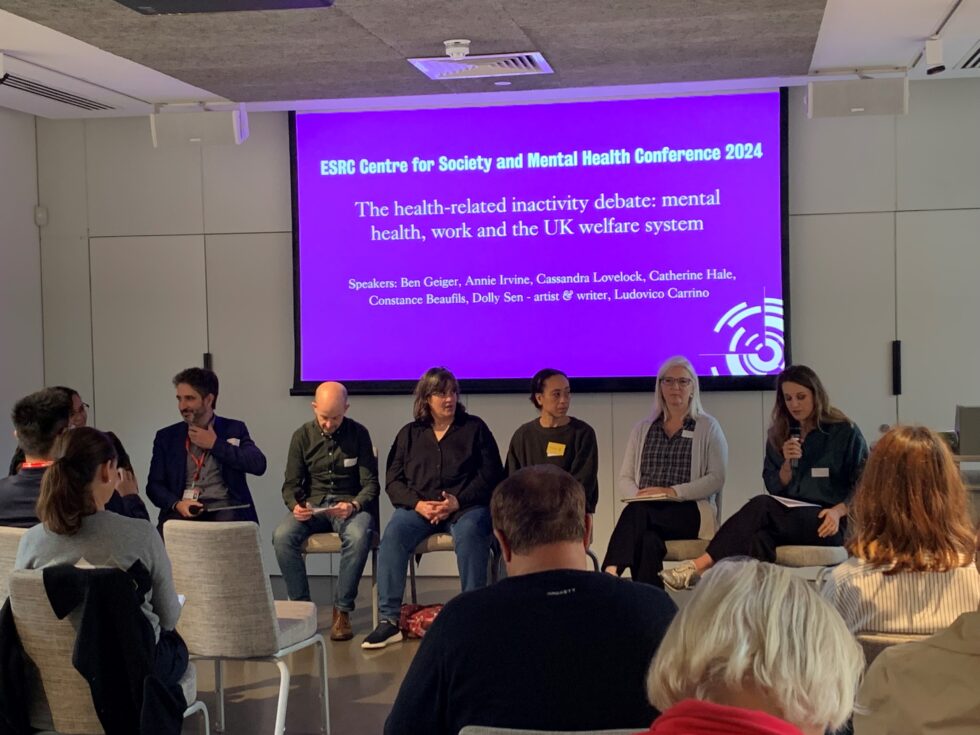The menopause is a natural biological process. It occurs when your ovaries age and naturally produce lower levels of reproductive hormones.
The menopause may have a significant impact on home life and work performance. This can be unsettling, particularly if a particular role carries lots of responsibility.
The hormonal changes in the body can also seriously impact mental and emotional health. Symptoms include:
- Mood swings
- Low mood or depression
- Stress and anxiety
Changes to one’s emotional and mental health can be the first sign of perimenopause.
Self-help measures, such as getting enough sleep, eating well, taking regular exercise and practising yoga or meditation, may help. A GP can also provide advice and assistance. This may involve talking therapies, medication or both.
In recent years, employers have become much better at recognising menopause as an important workplace issue.
‘Employers need to break the stigma and taboo surrounding the menopause at work and create an inclusive working environment where employees and managers feel confident to discuss any practical adjustments that may be needed.’ – Chartered Institute of Professional Development
If you are living with menopausal symptoms, notify your line manager or employer. Let them know what you are going through and how it’s making you feel. If your line manager isn’t understanding, speak to another manager or even the human resources department. Talk to your colleagues, too. Many of them may well know how you feel or have experience of supporting others.
Take steps to manage your symptoms, whether through lifestyle changes or medical treatment. A healthy lifestyle helps to manage the symptoms of menopause. This means:
- Getting enough sleep
- Eating well and exercising
- Avoiding too much alcohol or other substances
You can also:
- Be open with your partner about how the menopause curbs your sex drive
- Use lubricants to help with vaginal dryness
- Try meditation to reduce stress hormones and increase production of happy hormones, like serotonin and dopamine
- Maintain your social connections by seeing friends and family on a regular basis
- Seek support if you feel low and need to talk to someone
However you feel about the menopause, you may find physical events, such as mood changes and hot flushes, hard to manage. Don’t be afraid to talk about it and ask for help. Speak to your GP if the menopause is affecting your life. Help is available.
More from our blog
Understanding Stepped Care and its role in workplace wellbeing
The stepped care model is a fundamental part of Inspire's workplace offering. So, what is it and why is it so important?
Winter wellbeing 2024
The festive season is here and we’re keen to highlight some wellbeing tips for now and the New Year. Head into 2025 in the best possible frame of mind. Switch off Technology allows us to be constantly connected to colleagues, family and friends. That is often a good thing but…
Reflections on IEEE eHealthCom 2024: Insights, Innovation, and Inspiration in Nara, Japan
Inspire’s Digital Development Lead, Gillian Cameron, reflects on her recent trip to Nara, Japan for the IEEE eHealthCom conference. Last week, I had the privilege of attending and presenting at the IEEE eHealthCom 2024 conference in Nara, Japan. This annual event brings together researchers, industry leaders, and policymakers to discuss…
Mental Health on the Agenda at King’s College London
Inspire’s Policy & Campaigns Office, Matthew Coyle, reflects on his recent trip to King’s College London and the knowledge gained at the ESRC Centre for Society and Mental Health’s annual conference. I had the privilege earlier this month of attending the ESRC Centre for Society and Mental Health’s third annual conference in…
Healthy Organisations Commit to Person-Centred Wellbeing
Employment takes up a good deal of our time. According to the Office of National Statistics, the average UK worker spends over 36 hours in work every week; in Ireland, that figure is 38.5. On World Mental Health Day, understand the effect that wellbeing washing can have on workers and…
On World Mental Health Day, Here’s How to Avoid Wellbeing Washing
As we count down to World Mental Health Day on 10th October, Inspire’s focus is very much on our ‘Don’t Wellbeing Wash’ campaign. Wellbeing washing is similar to green washing, its arguably more infamous cousin. It describes a company or organisational ethos that focus more on the illusion of staff…
World Mental Health Day: Don’t Wellbeing Wash
World Mental Health Day (WMHD), which takes place every year on 10th October, offers us all an opportunity to gather and talk about mental health, demonstrating to everyone that this is a subject worthy of open, honest discussion and explanation. In 2024, Inspire is marking WMHD by highlighting the important issue…
Government Action on Work-Life Balance a Positive Sign
The UK Government has announced plans to introduce new codes of practice for businesses, which are aimed at tackling burnout and codifying a right to switch off. This follows on from Labour’s campaign pledge to empower workers, providing them with the freedom to disconnect from their jobs outside regular hours and…
Line Managers are Key to Workplace Wellbeing
According to new research published by Queen’s University Belfast and the University of Nottingham, strong links exist between positive business performance and mental health training for line managers. Furthermore, the analysis of workforce practices suggests that recognising this, and acting on it, could save organisations millions every year. The study…
Workplace Conflicts Require Proactive Approach
Discord between colleagues is not unusual. The average workplace brings together individuals from different walks of life, people with distinct characteristics, objectives, points of view and ways of doing things. Quarrels are bound to develop from time to time. They can, however, have a significant impact on an organisation’s productivity,…
CIPD Conference Stresses Authentic, Empathetic Leadership
Inspire\'s Noelle Higgins, Business Development Manager – Therapeutic Services reflects on the recent CIPD conference and research. My colleague Jonathan Cody and I recently took the opportunity to head to the CIPD conference at the RDS, enjoying a day away from our e-mails and catching up with a range of…












